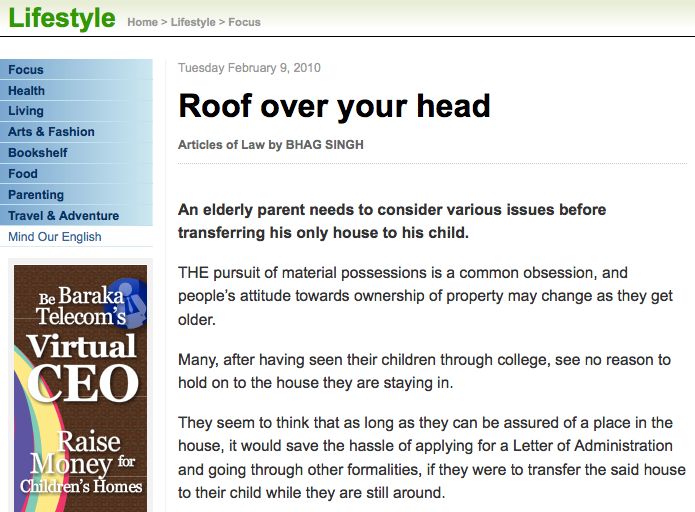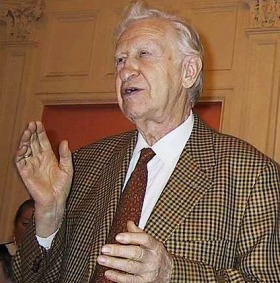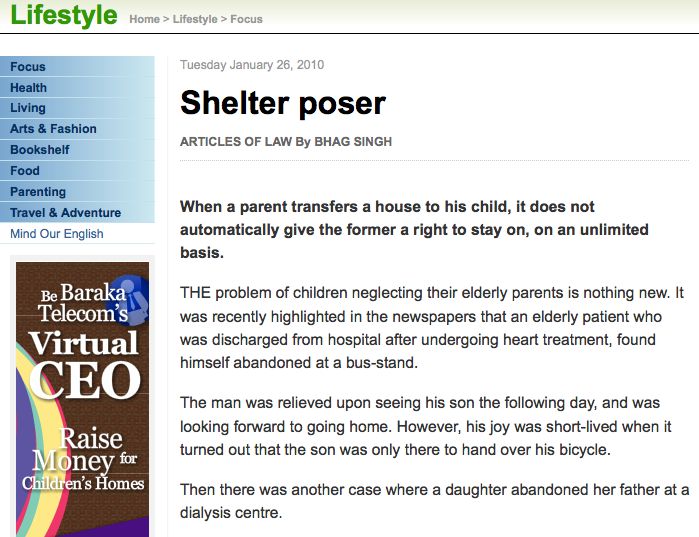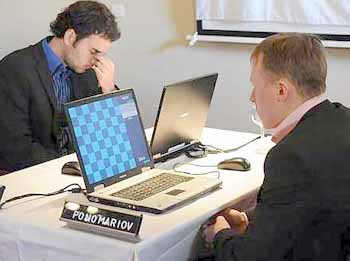An elderly parent needs to consider various issues before transferring his only house to his child.
THE pursuit of material possessions is a common obsession, and people’s attitude towards ownership of property may change as they get older.
 Many, after having seen their children through college, see no reason to hold on to the house they are staying in.
Many, after having seen their children through college, see no reason to hold on to the house they are staying in.
They seem to think that as long as they can be assured of a place in the house, it would save the hassle of applying for a Letter of Administration and going through other formalities, if they were to transfer the said house to their child while they are still around.
While the hassle of transfer may well be avoided by reason of such action, many a parent has found himself unwelcome to stay on as time goes by.
It was pointed out in this column about a month ago that where a parent chooses to transfer the house to his or her child, a measure of protection may be obtained through a formal agreement.
But does an agreement provide absolute protection?
This needs further elaboration.
The agreement
The idea of a parent and child entering into such an agreement may seem somewhat alien in the context of our society. However, it would provide a certain measure of comfort and security for the parent.
The rights of both parties in such a situation would depend on what is stated in the agreement.
In such a case, the express purpose is to provide for the parent a place in the house, in view of the fact that the house has been transferred to the child.
This is because if the house is unconditionally transferred to the child, in law it becomes the property of the child.
At that point in time, it may seem distasteful to talk about the parent’s entitlement to stay. Though the parent may think this is understood, such a belief does not create a legal right.
To create a right for the parent, there must be an express agreement that the parent is entitled to stay in the house for as long as he lives.
This would amount to a lifetime licence. Such an agreement can, of course, be oral but a written agreement is preferable.
What about the payment of quit rent, assessment, utilities and other such charges?
Again this is unlikely to have been expressly stated but could become an issue in due course.
The recipient may not think much of paying all these in the early stages but resentment may set in at a later point in time. Here again, an express agreement will help.
Dangers lurk
However, even a formal agreement may not necessarily protect the parent in terms of continued accommodation. This is because there may be other ways in which the rights of the parent to stay in the house may be affected.
Thus the child who needs money for a variety of reasons may decide to charge the house as security for a loan.
As the house is only used as security for the facility, the parent may feel unaffected because he is able to stay on.
In some cases, the parent may not even know that the house has been used as security. In other cases, the parent may not object to the property being charged. It may appear to be a win-win situation because the house is transferred to the child, the parent can stay there, and at the same time it can be used as security for a loan that the child requires.
However, a problem will arise if the child defaults in the repayment of the bank loan. When this happens and the breach arising out of the loan default cannot be rectified, the house may end up being auctioned to a third party.
In other situations, the child who is desperate for money may, unknown to the parent, enter into a sale and purchase agreement with a third party. The parent may only come to know about it when the new buyer turns up and asks him to vacate the house.
Parent’s option
Considering all these possibilities, it may be an option for the parent to keep his property for as long as he lives. But where a parent decides to do otherwise, there are other safeguards which can be explored.
The parent can lodge a caveat at the appropriate Land Registry, following a formal agreement entered into. This would alert a third party buying the property or giving a loan, as to the lifetime interest of the parent.
The parent can also stipulate that if he is deprived of staying in the house for any reason, then the child will provide alternative accommodation. Payment for all utilities and other expenses could also be expressly provided for.
Even if this is not in the initial agreement, it could be agreed to when steps are taken to charge or sell the house. But the opportunity for this would only arise if there was an express provision for the child to consult the parent before doing so.
Conclusion
Of course, many a parent may find all these rather cumbersome and prefer to hold on to the belief that the child will not turn out to be ungrateful. Such a belief may well be justified. But if it is not, the extent to which a parent may go to court to enforce his rights is another matter.
However, it bears remembering that while gratitude may be in abundance at the point of transfer of the property, such feelings are capable of being diluted by the passage of time. The sense of parental obligation may be affected by other influences and may also be blurred when confronted with other challenges.
At the end of the day, it is a personal decision for the individual involved. Perceptions and beliefs which a person grows up with no doubt plays a role. But any decision made certainly requires an appreciation of changing attitudes and times.
Read BhagSingh’s original story here.

 Many, after having seen their children through college, see no reason to hold on to the house they are staying in.
Many, after having seen their children through college, see no reason to hold on to the house they are staying in.
 THE problem of children neglecting their elderly parents is nothing new. It was recently highlighted in the newspapers that an elderly patient who was discharged from hospital after undergoing heart treatment, found himself abandoned at a bus-stand.
THE problem of children neglecting their elderly parents is nothing new. It was recently highlighted in the newspapers that an elderly patient who was discharged from hospital after undergoing heart treatment, found himself abandoned at a bus-stand.
 Singapore’s Health Sciences Authority (HSA) has issued an advisory warning people against consuming “The New Millennium Male Horse Power Capsule”, a health supplement manufactured in the United States and distributed locally by American Bioceutics Labs LLP.
Singapore’s Health Sciences Authority (HSA) has issued an advisory warning people against consuming “The New Millennium Male Horse Power Capsule”, a health supplement manufactured in the United States and distributed locally by American Bioceutics Labs LLP.